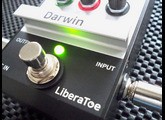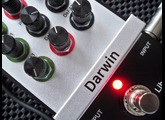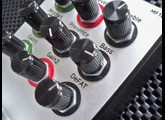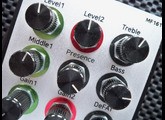« Amp-like and with Attitude »
Published on 04/22/23 at 05:13
Best value:
Excellent
Audience:
Anyone
Darwin is an analog touch-sensitive overdrive that can be purchased as a stand-alone pedal or as a module for the LiberaToe system (pedalboard/switcher). It’s amazing how any pedal or amp can sound different, depending on one’s speakers/cab sim, and so, be aware that the demo uses the Hagerman One Watter amp in the first part, together with a dual cab-sim (Fender Blackface + AC30). Stick a Marshall or MESA cab in there, or a different amp, and you get different tones. And this can be heard in the second part, using the Rivera Venus amp and its built-in cab sim. Regardless, there are a few key descriptors for this pedal: robust with a healthy dose of growl and grain.
Darwin is very much amp-like, in that adding this moderate-to-high-gain drive to a clean amp is like adding another channel… and without sounding artificial, over-processed, etc. It has some meat on them bones. The demo accompanying this review should make Darwin’s worth obvious, as the detail and harmonics literally dance about in the mix. And this pedal has a lot of headroom, created by the internal 18V supply, thus making a clean channel sound like a specialized high-gain amp.
Besides the sound quality, Darwin has a few features worth noting, including its dual-channel capability. The Green channel has its own volume and gain controls, but also a Middle control that allows you to scoop or add mids, whether going for an 80s Metal tone or something more Classic Rock. The Red channel has its own volume and gain controls, but also more saturation (its middle is fixed at 12-noon internally). Obviously, this pedal was created to merge rhythm and solo, with channel switching accessible within 0.4 seconds of holding the footswitch. Both channels share Presence (high-end control, just like an amp), Treble and Bass. They also share a DeFAT knob that eliminates that bottom end boom, flub and fizz, so that heavy muscular riffing remains tight and clear in the mix. This also means you can add some meat to thin sounding tones.
Although Darwin is a moderate to high-gain overdrive, it can merge with high-gain amps. I demoed this toward the end of the video, but two things of note: 1) I reduced the amp’s gain on its dirty channel to about 10-o’clock; and 2) I reduced Darwin’s Gain (on both of its channels) to zero, or all the way down (similar to adding a turned down Tube Screamer to a dirty amp for the purpose of providing some push or drive). That is how much attitude Darwin has, and it works well if you keep those two things in mind and in check. Darwin requires 160mA of power (typically negative center pin) and has a very solid build.
Darwin is very much amp-like, in that adding this moderate-to-high-gain drive to a clean amp is like adding another channel… and without sounding artificial, over-processed, etc. It has some meat on them bones. The demo accompanying this review should make Darwin’s worth obvious, as the detail and harmonics literally dance about in the mix. And this pedal has a lot of headroom, created by the internal 18V supply, thus making a clean channel sound like a specialized high-gain amp.
Besides the sound quality, Darwin has a few features worth noting, including its dual-channel capability. The Green channel has its own volume and gain controls, but also a Middle control that allows you to scoop or add mids, whether going for an 80s Metal tone or something more Classic Rock. The Red channel has its own volume and gain controls, but also more saturation (its middle is fixed at 12-noon internally). Obviously, this pedal was created to merge rhythm and solo, with channel switching accessible within 0.4 seconds of holding the footswitch. Both channels share Presence (high-end control, just like an amp), Treble and Bass. They also share a DeFAT knob that eliminates that bottom end boom, flub and fizz, so that heavy muscular riffing remains tight and clear in the mix. This also means you can add some meat to thin sounding tones.
Although Darwin is a moderate to high-gain overdrive, it can merge with high-gain amps. I demoed this toward the end of the video, but two things of note: 1) I reduced the amp’s gain on its dirty channel to about 10-o’clock; and 2) I reduced Darwin’s Gain (on both of its channels) to zero, or all the way down (similar to adding a turned down Tube Screamer to a dirty amp for the purpose of providing some push or drive). That is how much attitude Darwin has, and it works well if you keep those two things in mind and in check. Darwin requires 160mA of power (typically negative center pin) and has a very solid build.





